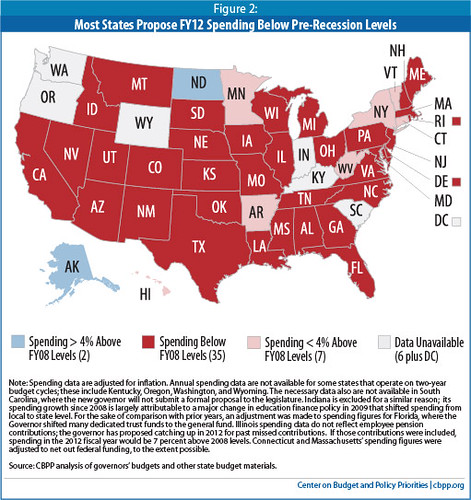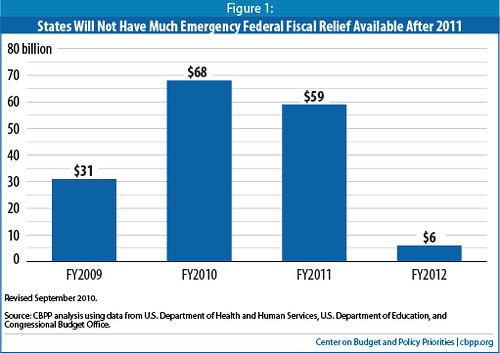Much of the commentary about budget expenditures for Fiscal Year 2012 are in a vacuum: both tax cut and program protection advocates seem to presume revenue streams not supported by the facts.
In the interest of an honest conversation about the fiscal context of State expenditures, herewith some graphics from the Center for Budget and Policy Priorities:
All this is in the context of downstream budget cuts by the feds:
In future WonkPosts, I’ll try to illustrate why the political demographics of Massachusetts work adversely to human-service providers in the current fiscal environment.
Please share widely!


For this data?
<
p>If it’s the “government spending inflation index” used by the Mass Buget folks isn’t that a circular reference. CPI is the broadest measure of inflation in the economy, no?
That said, the CPI is not, in and of itself, an indicator of inflation; you have to do the calculations.
<
p>Personally, I prefer the Big Mac Index for calculating purchasing power.
Indeed, have we not been fretting quite a bit about deflation?
Conservative economists have been fretting a great deal about inflation.
Have there been any of these actually doing this? Or is it just conservative TV hosts?
In particular there is a tendency to avoid mentioning food price inflation, which is bad, getting worse, and is largely ignored by too many economists when defining and gauging inflation as a whole.
If your point is that increasing food prices cause economic pain, I don’t think anyone would disagree with you. But unless the bulk of the state budgets fom 2008-2010 are going for food, I’m not sure how that is relevant here.
If a significant portion of state funding is going to wages and wages remain stagnant due to budget constraints while food prices rise then wages purchase less food. Also direct aid to poor families would be worth less as food prices rise. Perhaps an interesting data point to look at.
<
p>More importantly when it comes to state budgeting is the cost of healthcare which takes up a sizeable portion of the budget and is increasing in cost far above other inflation rates. Fuel costs are also going up quite a bit which hits agencies like the T particularly hard.
but I don’t see how that is relevant here. Wages of state employees aren’t rising, they are declining. Because there is no money.
<
p>Not for tax cuts. Not for increased wages. Indeed, not for existing wages.
States are spending less money. If they were hiring people and giving out raises, that wouldn’t be true.
<
p>Instead, one can’t read a newspaper without hearing about some town or other that is freezing wages and laying off teachers.
<
p>If public sector employees are being laid off, then public sector employees are being paid less.
2008 – 31,944.3
2009 – 32,645.3
2010 – 32,552.2
2011 – 32,928.8
<
p>This, spending with no adjustments for inflation, federal sources v. state sources…just spending.
<
p>Looks pretty level to me. And without knowing the ‘mix’, i.e. amounts spent on government labor versus, say, transfer payments (medicaid, welfare…) how to conclude that labor is flat, up or down?
…the price of food, housing, and other staples; not to mention health care, college tuition for one’s children, etc. takes an importance out of proportion to economic models.
<
p>The issue is not “the bulk of the state budgets from 2008-2010 are going for food”, but the percentage of personal income there going.
<
p>From a purely political perspective, the inability to “feel one’s pain” has political importance – to one’s opponent. While the story of George H.W. Bush and the supermarket checkout scanner is a myth, it definitely worked to the advantage of Bill Clinton in 1992.
<
p>While I don’t get an existential crisis from my grocery bill, plenty of people, the same isn’t necessarily true for folks on limited or fixed incomes – and that includes a lot of nominally middle class people these days.
<
p>Just check out your closest food pantry.
<
p>My point was that omitting food price inflation from economic models has consequences, because it impeaches the credibility, both of those who create the specific model, and of economists as a profession.
<
p>
“Most states propose spending below pre recession level”.
<
p>Noted, to reach the conclusion they first adjust for inflation. Then, they ‘net out Federal funding’.
<
p>Memo to Budget and Policy: Spending is expense; funding is income.
<
p>It is like saying to the family,
<
p>”Hey we’re spending less, if you ignore the money that the inlaws gave us.”
<
p>”We’re spending less if you ignore we hit mega-bucks”.
<
p>”We’re spending less if you ignore the new raise.”
<
p>Memo to Budget and Policy: why not just preface every, single study you’ve ever done or ever will do with a warning that your study will ultimately conclude that massachusetts taxes are too low.
My point was about revenue streams, which for the record, have included federal revenue-sharing in State budgets since the Nixon Administration created the policy.
<
p>Your family metaphor illustrates a cultural problem common across the political board: free-lunch premises, which apply as much to supply-side economics as to human service triumphalism.
<
p>It’s gilding the lily, but what the hell: The biggest welfare queen in Massachusetts is Abby Johnson.
<
p>Any point about existing revenue streams is independent of the issue of tax increases in isolation. The choices include greater governmental efficiencies and austerity.
<
p>As I mentioned in the last sentence of my post, the political climate operates adversely to human service providers. I haven’t the time to address this in detail, but one thing is set in concrete:
<
p>There will be no graduated income tax, nor will we see any broad-based tax increase in Massachusetts; the political base isn’t there.
The ONLY bank that kept lending to business, that put residents first, and isn’t owned by banksters is {drum roll} the State Bank of North Dakota That is why there is an island of blue amongs the sea of red cuts.
<
p>Dependency on banksters is, in fact, fatal. THAT is what your graphic says to me.
that kept lending to businesses, which I can only assume in my totally uninformed way, are mostly farmers, family and corporate, and farm suppliers.
<
p>More?
Here, here, here,and here for example.
Wicked Local has a pretty informative story today
<
p>Whaddya think? Have we still got time to pull this off. Should we?
<
p>
…socialism works? Well what do you know!
BND didn’t have to answer to the FDIC.
North Dakota kept its money for … North Dakota taxpayers and that meant farms, small manufacturers, and local businesses not the oligarchs and plutocrats!
<
p>Folks, local control works.